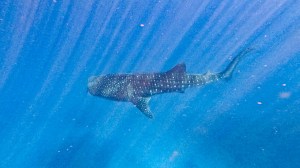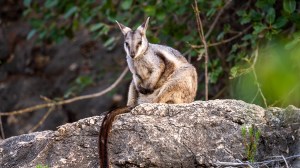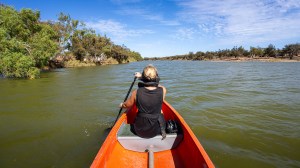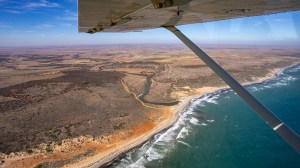The Outback fills some 70 percent of the massive island continent of Australia, roughly the size of the U.S. It’s scantly populated, except for the more than 150 species of venomous snakes. Temperatures rise as high as 123 degrees. But within this unforgiving landscape, made famous by Steve Irwin’s Crocodile Hunter, are braids of rivers, bouncing marsupials, rolling mountains, ancient reptiles, coastal cliffs dwarfing California’s Big Sur, and the oldest continuous living culture in the world, all ready to be explored.
Still, there is no way around the elephant (emu?) in the room: Going deep into the Outback and really experiencing what it has to offer means sacrificing certain luxuries, even at a five-star property.
“Our guests enjoy staying with us because of our connection to nature and our overarching respect towards it,” Janine Carter, the head of tourism and business development at Bullo River Station, an all-inclusive cattle ranch in the Northern Territory that’s priced at roughly $3,000 AUD (about $1,900 USD) a night. “They value the unique opportunity to see behind the scenes of a working cattle station and enjoy interacting with our young and old ringers. It’s seeing another way and pace of life that really engages… and helps them disconnect from their typical everyday at home. And that escapism is what a holiday should be all about.”
Sparsly populated, you won’t find typical luxury resorts way out here.
Dalton Johnson | @lifeasdalton
Unlike a trip to the more fashionable sections of Montana or Colorado, luxury in the Outback means getting your boots dirty to wrangle cattle and challenging your lungs while swimming with whale sharks along the Ningaloo Reef—they’re surprising fast. You’ll wear a face full of dust after an ATV ride and step knee-deep into a billabong to fly-fish. Your favorite shirt will be soaking with sweat as you search for the endangered rock-wallabies. The toilets are more likely to drop than flush.
To get into the spirit, and pick up a few survival skills, start by getting to know the Aboriginal people who have continuously stewarded this country for more than 65,000 years. During a cultural immersion, you will go beyond the stereotypes to learn about the land via songlines and dreamtime. Walking with an Aboriginal guide like Darren “Capes” Capewell, founder of Wula Gura Nyinda, you’ll learn how to see the wind in the carved landscape and where to find food from the animal tracks. You’ll begin feeling your way through the landscape, using your instincts and heart to guide your journey.
“Seasoned travelers understand that transformative travel experiences sometimes require sacrifice,” says Todd Smith, founder of AdventureSmith Explorations. “Australia’s Outback offers endless expanses of open space, amazingly adapted wildlife, intriguing stories and traditions of Aboriginal culture, and spectacular starlit skies. Sunrise at Uluru or viewing ancient cave paintings can be spiritual experiences and many travelers return with a profound sense of well-being.”
And while you won’t find a tricked-out Four Seasons, you will find luxury tents similar to your favorite African bush camps. At Sal Salis, the only luxury retreat in the Cape Range National Park within the remote north of Western Australia, you’ll find a collection of tents and central lobby and dining room. Here, the wild reef is your swimming pool and the stars are your TV screen (there is no internet or cell service).

Most come to Ningaloo and stay at Sal Salis to swim with whale sharks.
Dalton Johnson | @lifeasdalton
“[The Outback] isn’t about giving up luxury,” says Ella Chronowski, content manager of Sal Salis, where rates are roughly $1,800 AUD ($1,100 USD) per night. “It’s about being immersed in a destination and connecting with nature.”

Rare rock wallabies are a bush trekking highlight.
Dalton Johnson | @lifeasdalton
And if luxury to you means eating and drinking well, there will be no sacrificing to do—multi-course dinners full of hyper-local produce and excellent local wines (even bottles of Bollinger) are free flowing.
You won’t feel like you’re giving up luxury when you charter a helicopter to a billabong to fly-fish, either (just mind the crocs). Birders will feel like royalty hiking with an ornithologist to spy a princess parrot (just don’t step on a deadly snake). The snorkeling is better than the Maldives—full of reefs untouched by development—but the sharks are a real concern. It’s a balancing act that raises the big questions.

Natural lovers immersing themselves in the wilderness—just mind the crocs.
Dalton Johnson | @lifeasdalton
“The stoics identified the path to achieving a life well-lived as practicing the four virtues (wisdom, courage, moderation, and justice) and living in accordance with nature,” says Smith. “In this way, many modern-day travelers practice stoicism and a comparison can be made for visiting Australia’s Outback. If trading comfort for personal fulfillment is required, then there is no trade-off: eudaimonia [good spirits] wins every time.”
Credit: robbreport.com











